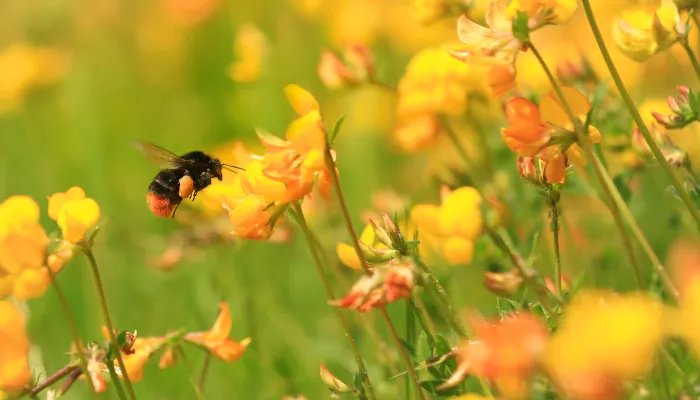The Secretary of State’s decision to authorise the use of an environmentally devastating chemical to increase production of a crop with no nutritional value is madness.
The Wildlife Trusts are dismayed that the Government are asking us to choose between the plight of farmers and the plight of bees and wild pollinators. Farmers are in the eye of the storm, experiencing the impact of climate change and more extreme weather events including the mild winter last year, which fuelled the virus affecting sugar beet. Farmers need support and encouragement with using alternative options in dealing with pests and disease, such as Integrated Pest Management (IPM), less mono-cropping, increasing soil health and building resilience into the farm to help combat climate change impacts and reduce the reliance on chemicals that pollute soil and kill insects.
The weight of evidence shows a significant environmental risk posed by neonicotinoids – particularly to our bees and other pollinators – and hundreds of thousands of people came together across Britain over the last decade to call for better protection of our bee populations, and for these highly toxic pesticides to be banned.
What's more, sugar is a crop with zero nutritive value and it is an accepted fact that we currently consume far too much; it is a significant contributor to the obesity epidemic and associated surge in diabetes. In response to this epidemic and the associated cost to the NHS, our Government introduced a sugar tax on fizzy drinks to try to reduce our intake. This move sits at odds with their latest decision to allow the return of a pesticide, which will enable the growth of a crop that is at the root of the problem - one which we know will cause environmental harm.
In 2017, the then Environment Secretary, Michael Gove, said*:
“I have set out our vision for a Green Brexit in which environmental standards are not only maintained but enhanced.
“I’ve always been clear I will be led by the science on this matter. The weight of evidence now shows the risks neonicotinoids pose to our environment, particularly to the bees and other pollinators which play such a key part in our £100bn food industry, is greater than previously understood. I believe this justifies further restrictions on their use. We cannot afford to put our pollinator populations at risk.”
It is unfortunate that within seven days of the end of the Brexit transition period, his successor Mr Eustice, has agreed to a derogation of the law preventing the use of neonics.
Julia Hunt, Head of Advocacy at Kent Wildlife Trust, says:
“Insects aren’t just interesting, they’re vital. Not only do they provide food for all sorts of animals including birds, bats, reptiles, amphibians and fish; they are also critical for humans. They pollinate our crops, control pests and recycle nutrients in the soil. Yet since 1970, we have lost 50% or more of our insects, and 41% of the remaining species are now threatened with extinction. Destabilising ecosystems further will only make matters worse. We all rely on insects, and the Government needs to help farmers to employ approaches that support our insect populations, not annihilate them.”
Joan Edwards adds:
“It’s absurd that as the UK Government commits to spending £3bn of international climate finance on restoring nature and biodiversity, it is also approving the use of nature-destroying neonicotinoid pesticides here in the UK. The Prime Minister is right to say that we will not achieve our goals on climate change, sustainable development or preventing pandemics if we fail to take care of the natural world that provides us with the food we eat, the water we drink and the air we breathe. But the UK Government cannot claim to be a ‘world-leader’ on protecting and restoring nature whilst supporting the use of these damaging pesticides.”
Kent Wildlife Trust has further advice for people on taking action to help insects at home or in communities by becoming an insect champion here.
*See Defra press release Environment Secretary backs further restrictions on neonicotinoid pesticides
Take Action for Insects
41% of insect species face extinction. But it’s not too late, and with your help, we can help insects recover.

